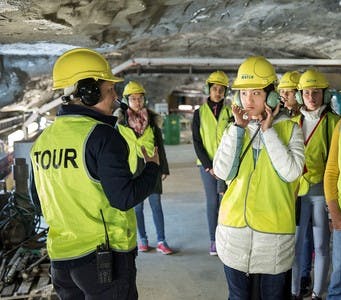Water Geography online - Stage 4 Geography resources
What is Water geography online?
Looking for inspiration for Geography inquiry learning and ideas for water fieldwork?
Water geography online gives you the learning tools and resources to explore how we apply real world geography.

Choose from four Stage 4 Geography topics, looking at:
1. The Water Cycle - explore the natural water cycle, water as a resource - whatever the source - and understand how it's collected and treated to protect public health.
- Natural water cycle – find out about the continuous movement of water around the world.
- Water quality and filtration – find out how we choose the best source of water and filter it.
- Dual site - drinking water and water recycling booking – see two sites in one day both drinking water and wastewater.
2. Scarcity and management – explore the importance of every person working together to ensure the we have water now and in the future, to build resilience and manage potential hazards.
- Drought response – see how we manage our water supplies during drought.
- Water wise behaviours – see how we can all think about how we use water.
- Orchard Hills Water Filtration Plant Booking – visit and learn more about drinking water quality and filtration.
3. Water and Life - explore water in everyday life with care and value and how we can be more water efficient to contribute to a sustainable environment.
- Wastewater audit – work out what is in your wastewater and see how you can reduce your impact on the environment from inside and around the home.
- Water audit – find out how water efficient your school or home is.
- Penrith Water Recycling Plant Booking – visit and learn more about wastewater treatment and water recycling.
4. The Value of water – explore our stormwater and waterway network through self-guide programs, water way excursions, and Sydney Water's waterway strategy and changes overtime.
- Self-guide excursions - investigate the value of a stormwater channel or waterway in an urban environment.
- Stormwater - find out what stormwater is and how it can be re-used.
- Stormwater audit - find out where the water goes when it rains.
- Sign up with your school email* and check out our video highlighting key features of this page. *You are only required to provide the required information indicated by the asterisks on the registration form. School emails will only be able to participate in our Q&A.
- Check out our sample timelines, lesson plans and assessments to help you deliver our Water geography programs.
- Start asking questions, share your stories and test your knowledge.
What else will you find on Water geography online?
Self-guide excursions
These excursions programs are designed for teachers to deliver to their own students or a select number can be presented by our Education Team. The sites are all open to the public.
Ask questions
This is a great place to ask about things you can't find easily in your textbooks, about Sydney Water, water management and the water industry.
Share feedback and ideas
You’ll be able to engage with our team, other students and teachers. You could leave study tips, present your geography projects or give feedback on our content.
Excursions
Come behind the scenes and see how we provide clean, safe drinking water and treat wastewater to keep our rivers and beaches clean.
All our programs are free of charge, and most are syllabus linked.
Want to know more about our Education resources or book an excursion contact Education@sydneywater.com.au.
Have a geography question?
This is where you can ask your questions and our education team can answer them.
Check out some geography FAQ we get from other year 7 and 8 students.








